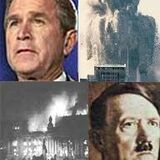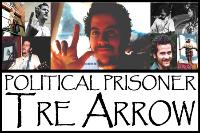Friday, August 7
U.S.-Promoted Kiddie, Drug Smuggling In Southeastern Iraq
Join with me for a "golden oldie" moment excerpted from the rotting crypt that is the venal Cheney-Bush administration. The date: 11 March 2005. The event: U.S. House hearing on Defense Department FY2006 budgeting. Some of you may actually recall this incendiary exchange:
Rep. Christine McKinney (D-GA): Mr. Secretary, is it policy of the U.S. Government to reward companies that traffic in women and little girls?But as we found out months later, Rumsfeld was lying (again) about "policy":
[Defense Secretary Donald] Rumsfeld: Thank you, Representative. First, the answer to your first question is, is, no, absolutely not, the policy of the United States Government is clear, unambiguous, and opposed to the activities that you described. The second question.
McKinney: "Well how do you explain the fact that DynCorp and its successor companies have received and continue to receive government contracts?" [video clip here and here]
His Pentagon neither had outlawed contractors' trafficking in forced labor or sex slaves. And oh, by the way, Rummy pal VP Dick Cheney's old company Halliburton subsidiary KBR--what McKinney termed "successor companies"--also continued receiving govern- ment contracts after charges were leveled for similar forms of trafficking.
(Note: The reason nothing can change America's hunger for pedophilia is, according to Ted Gunderson, former FBI supervisor of the Los Angeles field office, the U.S. Congress is deeply involved in all that lusty sex with children. See 8 October 2006 Milkhouse Mouse story "DC Trouser Treats: Washington's Pedophilia in the National Interest."*)
(And don't you know by DC standards, Rep. McKinney is an uppity nigress without a clue to "her place." For her indelicacy that day in outing ol' Rummy before the U.S. House and television cameras (okay; so it was C-SPAN), a GOP campaign hit committee rallied Republican voters to defeat six-time incumbent McKinney in Georgia's 2006 Democrat primary in the 4th congressional district. Unlike most states, Georgia permits cross-party voting in primaries.
That's just one strategy for handling dissident in Washington.
Blackwater Sex (and Drug?) Ring
Last night (Thursday, 6 August), MSNBC's news host Keith Olberman of Countdown quoted
from the employees’ sworn declarations —...that [US security contractor] Blackwater was guilty of using child prostitutes at its compound in Baghdad’s fortified Green Zone and that owner Erik Prince knew of this activity and did nothing to stop it.So poverty in a war zone really is an "aphrodisiac" for the poor, right? But I digress:
The declarations describe Blackwater as “having young girls provide oral sex to Enterprise members in the ‘Blackwater Man Camp’ in exchange for one American dollar.” They add even though Prince frequently visited this camp, he “failed to stop the ongoing use of prostitutes, including child prostitutes, by his men.
The former employees additionally state that Prince was engaged in illegal arms dealing, money laundering, and tax evasion, that he created “a web of companies in order to obscure wrong-doing, fraud, and other crimes,” and that Blackwater’s chief financial officer had “resigned … stating he was not willing to go to jail for Erik Prince.Hmmm..."Wrong-doing"? "Other crimes"? What in the world could this American press story be possibly be alluding to here?
Iraq's post-2003 role--after the US invasion--is totally marginalized by U.S., British and Canadian press. But last December, Alzeera-English correspondent Mosab Jasim, reporting from Amarah, Iraq, revealed that county's role in exportig Afghani opium and heroin into Europe, and implies the U.S. occupying forces' role esuring the success of Iraqi drug smuggling efforts.
Last December, Informed Consent blogger Juan Cole, a Professor in the University of Michigan's Middle East Studies program, commented on Jasim's reportage on Al Amarah's drug smuggling; he, however, forgoes any mention of US involvement, though Blackwater/Xe's creation of "a web of companies to obscure wrong-doing" is a U.S. intelligence Old School method for hiding involvement in and proceeds from drug smuggling.
*Lest we forget:
Male prostitutes toured Bush 41 White House before federal agents were sent into the streets to collect and destroy copies of this Thursday, June 29, 1989 Washington Times headline story by Paul M. Rodriguez and George Archibald which led to multiple follow-up stories.
If you read deeply enough, you'll understand why Senate Banking Committee chair Barny Frank (D-MA) was uncharacteristically mum during oversight hearings addressing the missing billions from the 2008 Wall Street Banking Bailout.
- "'CALL-BOY' SERVICE PROSPERS USING HIGH FINANCE, HIGH TECH," Paul M. Rodriguez and George Archibald , The Washington Times, June 20, 1989
In which we see Henry Vinson's name first surface, along with Robert Chambers, a funeral director, who operated a call boy network that laundered money through umbrella organizations in the District of Columbia area, Florida, Kentucky and West Virginia.
- "POWER BROKER SERVED DRUGS, SEX AT PARTIES BUGGED FOR BLACKMAIL," Michael Hedges and Jerry Seper, The Washington Times, June 30, 1989
In which we learn of Craig J. Spence, who arranged midnight tours of the White House, threw lavish parties for the famous and powerful where cocaine was generously served, spent $20,000 a month on male prostitutes from a D.C. prostitution ring, and bragged of connections to the CIA, whom he worried might kill him and then make it look like a suicide.
- "RNC CALLS SCANDAL A 'TRAGIC SITUATION,'" George Archibald and Paul M. Rodriguez, The Washington Times, Friday, June 30, 1989
In which we learn of the resignation of an aide to Secretary of Labor Elizabeth Dole, and of the reaction of Rep. Barney Frank, who is "not surprised" by the revelations.
- "White House mute on 'call boy' probe," Frank J. Murray, The Washington Times, July 7, 1989
In which we learn that President Bush followed the story, and that a Uniformed Division officer of the Special Service, Reginald deGueldre, arranged the midnight White House tours for Craig Spence and two male prostitutes, and was moonlighting as Spence's bodyguard.
- "Spence was target before raid on ring," Jerry Seper, and Michael Hedges The Washington Times, July 10, 1989
In which we learn that Craig Spence brought a 15-year old boy on at least one of his midnight tours of the White House, that Spence asked detailed questions about the Delta Force operations, that he partied with former U.S. Attorney Joseph diGenova and his wife, Victoria Toensing, and that he bragged of having blackmailed a high-ranking Japanese politician, Motoo Shiina.
- "Spence ma[y] be Shiina's downfall," Edward Neilan, The Washington Times, July 18, 1989
In which we hear of the connections between Motoo Shiina, groomed to be a future prime minister of Japan, and Craig Spence: how Spence had made more than $700,000 from Shiina's Policy Study Group, and how Spence had refused to pay back a loan made by Shiina for the purchase of Spence's house.
- "First lady not worried about hookers' tour of White House," Paul Bedard, The Washington Times, July 10, 1989
In which we learn that First Lady Barbara Bush was not concerned about the security questions raised by midnight White House tours, but did think it good that the Washington Post had not followed the Times' story.
- "Secret Service furloughs third White House guard ," Jerry Seper, and Michael Hedges, The Washington Times , July 26, 1989
In which we hear that, contrary to earlier White House claims, 1 a.m. tours were "totally out of the ordinary." We also learn that Spence introduced a 15-year old boy to Ted Koppel in the Nightline studio right before one of the tours.
- "SEX PARTY HELD AT AUSSIE EMBASSY 'WE'RE NOT TALKING CROCODILE DUNDEE HERE,'" Michael Hedges and Jerry Seper, Washington Times, July 28, 1989
In which a woman who worked for one of the prostitution rings linked to Spence claimed she worked a party held at the Australian embassy. She also claimed that one of her military clients told her Spence was blackmailing him.
- "SPENCE ELUSIVE, SAID TO BE EVERYWHERE BUT ISN'T," Jerry Seper and Michael Hedges, Washington Times, Thursday, August 3, 1989
In which we learn that Spence has disappeared, but has told his friends not to take any account of his death at face value. We also discover that Ted Koppel is a longtime friend, and that the Special Service is not as interested in credit card fraud as they are in Spence's military and political connections.
- "SPENCE ARRESTED IN N.Y., RELEASED BIZARRE INTERVIEW IS NO NIGHT ON THE TOWN," Jerry Seper and Michael Hedges, Washington Times; August 9, 1989
In which Craig Spence is interviewed and speaks of his own death and of the connections he had to powerful people who will pretend never to have known him.
- Spence arrested in N.Y., released; Once-host to powerful reduced to begging, sleeping in park, Michael Hedges, and Jerry Seper, The Washington Times, August 9, 1989.
More from Craig Spence's interview. Highlights include his hint that Donald Gregg arranged the late-night White House tours. Spence also speaks of more significant secrets that he plans to take to the grave.
- "Sex sold from congressman's apartment: Frank's lover was 'call boy,'" Paul M. Rodriguez and George Archibald, The Washington Times , August 25, 1989.
The only story that received much attention. A male prostitute, identified by the alias Greg Davis, entertained clients in the apartment of Rep. Barney Frank. Frank admitted having a relationship with the prostitute, but denied knowledge of the use of his apartment for illicit purposes.
- "Sex sold from congressman's apartment: School used as base for sex ring," George Archibald and Paul M. Rodriguez, The Washington Times, August 25, 1989.
In which we learn that Barney Frank's call boy also did business in a local public school.
- "THE GOBIE STORY: Frank's 'call boy' tells all," George Archibald, and Paul M. Rodriguez, The Washington Times, September 1, 1989.
In which Stephen L. Gobie, whose professional name in the underground prostitute trade is "Greg Davis," insists that Rep. Barney Frank knew of the use of his apartment as a base for prostitution. Gobie also reveals that one of his clients was Craig Spence.
- "IN DEATH, SPENCE STAYED TRUE TO FORM," Michael Hedges, and Jerry Seper, The Washington Times, Monday, November 13, 1989.
Craig Spence is found dead in a Boston hotel room. Near his body is a newspaper clipping that details legislative efforts to protect CIA agents called to testify before government bodies. Friends of Spence reported that he had claimed the CIA used the call boy service to compromise other federal intelligence officials and foreign diplomats. One friend quoted Spence as saying, "Casey's boys are out to get me,"
- "SPENCE AS MUCH AN ENIGMA IN DEATH AS HE WAS IN LIFE," Jerry Seper, and Michael Hedges, The Washington Times, November 13, 1989.
In which we learn how slow had been the federal investigation into the allegations swirling around Craig Spence. Spence himself had been handed a subpoena more than two months before his death, but was never called to testify. Officials of the Reagan and Bush administrations, identified in The Times as having used the call-boy service, had not even been contacted by law enforcement officials. One witness reported: "They asked me what I thought Spence wanted to know about the Delta project."
- "Prostitutes corroborate Frank stories," Paul M. Rodriguez, The Washington Times, February 2, 1990.
In which other prostitutes corroborate Gobies' claims that Rep. Barney Frank knew of his use of the congressman's apartment for use as a bordello. Gobie also claims that Craig Spence was one of his clients and had tried to recruit him to help "in a sordid scheme to blackmail the powerful politicians invited to his lavish parties." Gobie claimed that Mr. Spence said to him, "Do you know what kind of power you can have over people if you've got something on them? . . . I need boys and girls for people in government and high-level businessmen for my parties, for individuals, for whatever comes up."












